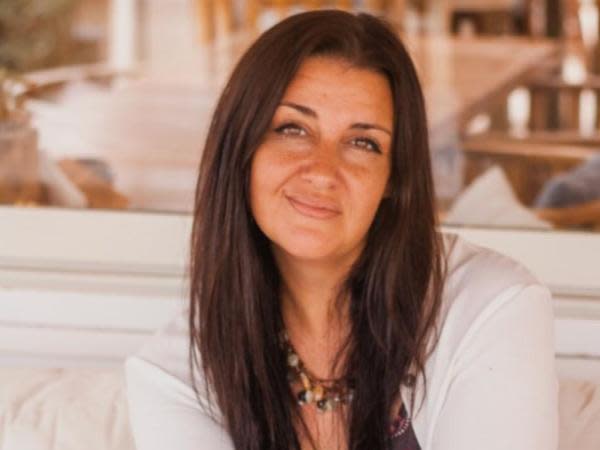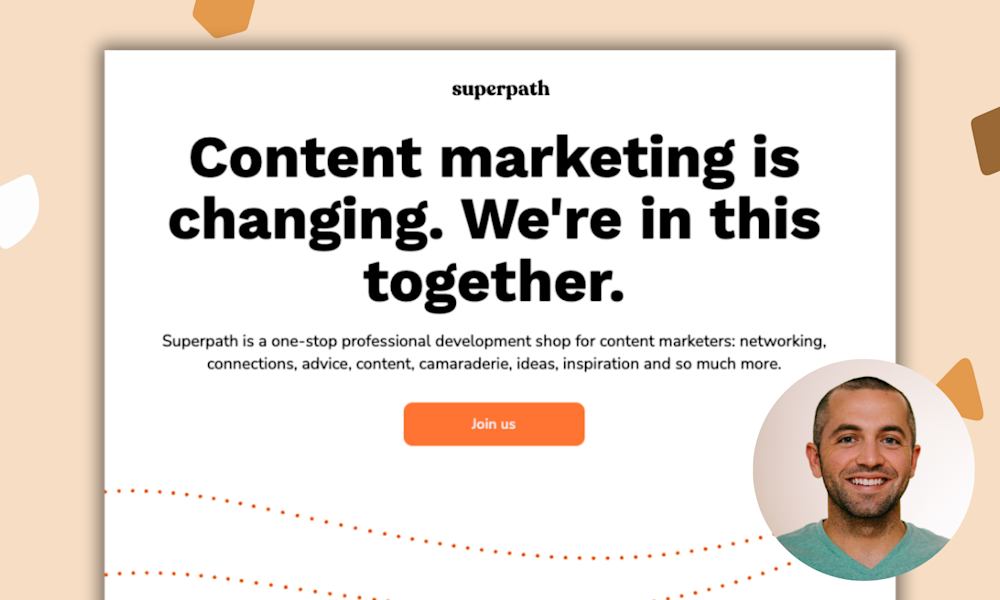What if online piano lessons were more effective than traditional, in-person classes?
When piano teacher Joseph D’Amico received a webcam as a Christmas gift, he began his journey into the world of virtual education, swapping long commutes to students’ houses for a home-based business teaching piano online.
Since then, Joseph has built an innovative system for classical piano instruction using a hybrid membership model. Through his business, Flex Lessons, students can enjoy a vast library of prerecorded training videos in addition to real-time lessons.
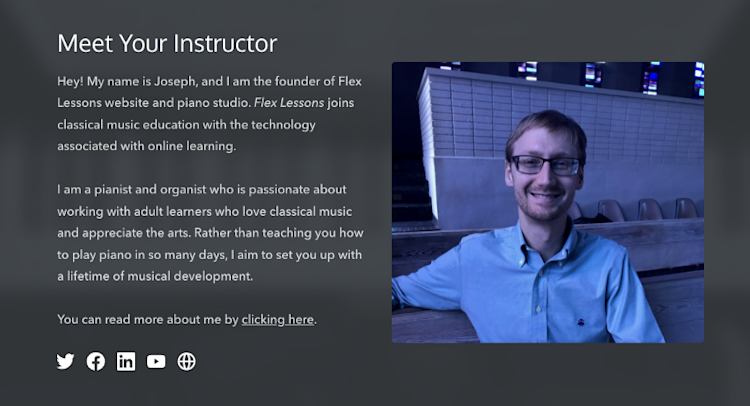
Now, Joseph is able to reach more learners and provide a quality music education without a steep price tag.
Here’s how he’s helping aspiring classical pianists play their first note and build a strong foundation for their musical future.
“I realized … online lessons could lead to crazy good self-sufficiency for students.”
When he graduated from college, Joseph did what most music teachers do. He drove to his students’ houses for piano lessons and hoped to eventually ditch the traffic by transitioning to a home studio.
Then someone bought him a webcam as a Christmas gift. He decided to experiment and used the camera to run virtual makeup sessions with his piano students. They loved it.
Half his students decided they would rather do online lessons immediately, and the rest came on board once they realized how convenient remote learning could be.
Joseph spruced up his video recording tools to create the most seamless online learning experience possible, and by 2018, Joseph was teaching piano online full-time.
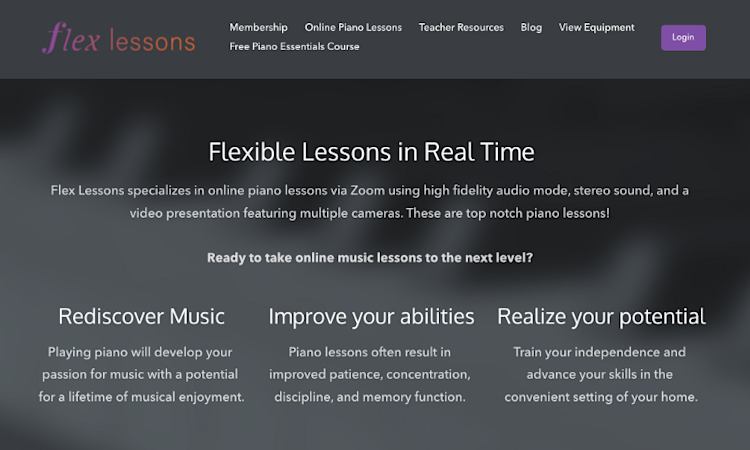
In addition to providing more flexibility for his students, Joseph noticed higher engagement in his virtual lessons.
“When you’re showing people things, you’re sitting next to them, and you give off a lot of cues that help them. When you go online, and they don’t have access to any of that, you realize what they really know and what they don’t know,” Joseph explains.
“Despite my best efforts in teaching, some students didn’t know how to find their starting position. Some students didn’t know how to do basic things like count or figure out the metronome because I’ve been doing it this whole time. And so I realized, if I just lean into that a little bit, online lessons could lead to crazy good self-sufficiency for students.”
To promote his online music business and find students, Joseph started writing SEO articles. He also grew his YouTube channel and connected with potential clients on Reddit.
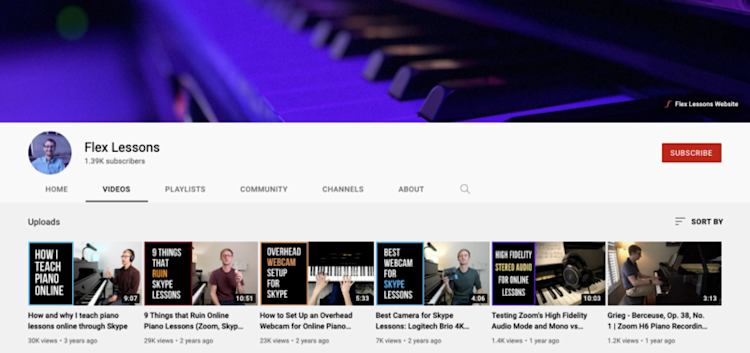
His marketing efforts paid off, and Joseph began attracting adult students from all over the world who were interested in learning piano.
“The demographics are totally different. You’re teaching them to be self-sufficient, and it’s a win-win. It’s awesome. Everybody is footing the bill, and it’s their lifelong dream to learn piano. And every lesson is very, very inspiring,” Joseph says.
“Some people are way smarter than me, and I’m teaching them how to do this thing. I’m still blown away that a surgeon’s going to listen to what I have to say, you know, but it’s happening.”
“Surely there’s a way to automate this.”
Over time, Joseph noticed that many of his students were asking the same questions in their lessons.
“I attract a lot of adult beginners, and I realized that I was saying literally the same thing to all of my students, almost verbatim. They all have almost the same questions. They are all making almost the exact same mistakes. Surely there’s a way to automate this.”
So Joseph got to work.
The standard way to work with music students is to meet with them one-on-one every week. Teachers need to charge a decent rate for this since it’s live labor, and it can cost a fortune.
Joseph realized that not all instruction needs to be live, so he came up with an idea for a hybrid model where students can learn from prerecorded lessons within his membership community as well as live sessions.
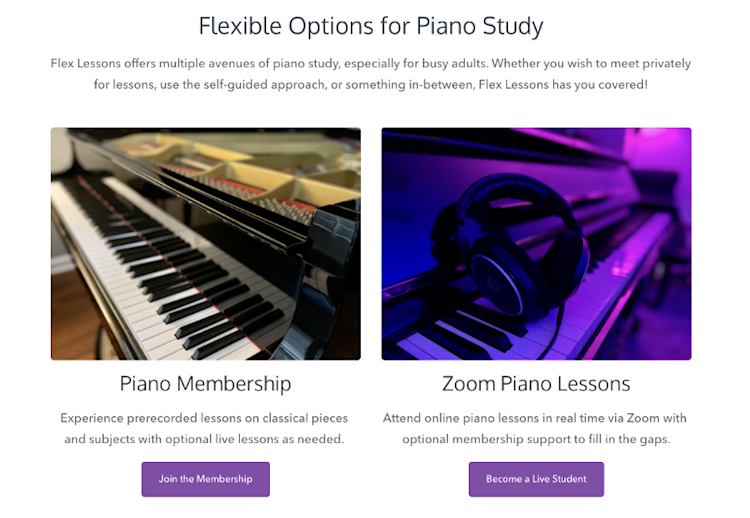
When a student joins Joseph’s membership, they get access to dozens of courses that build on each other. Learning to play classical music is progressive, so as members work through each level, they build new skills that they can apply later on.
Each course comes with several pieces of music for students to practice and video tutorials teaching them how to play.
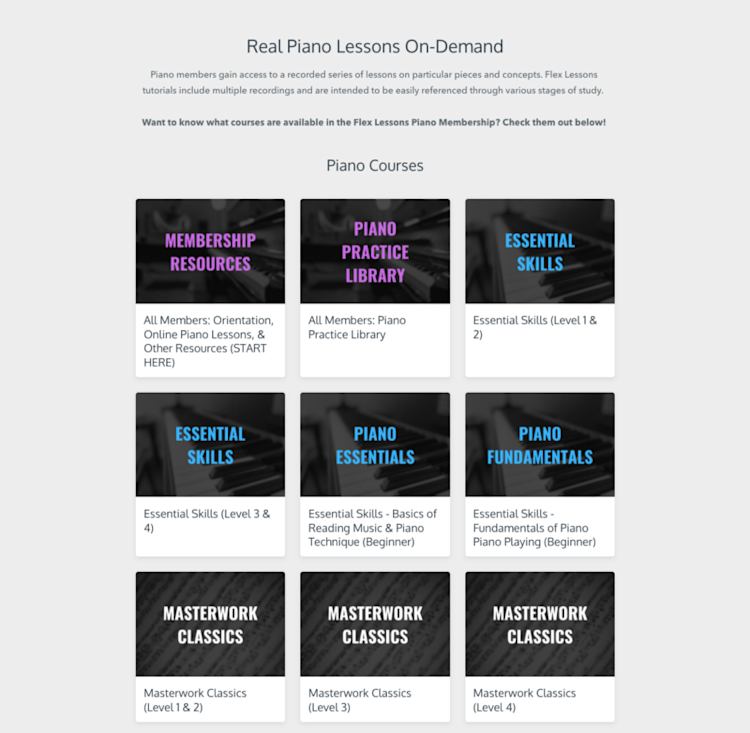
If a student needs help, they can book Joseph for a private lesson. All they have to do is click a link to put themselves in the schedule. They become a hybrid student once they’ve received both types of instruction. Joseph even offers the first lesson for free as an added perk.
Joseph also created a free “Piano Essentials” video course that teaches basic piano foundations. In 18 lessons, participants learn how to read all the notes on the treble clef and the bass clef, understand basic rhythms, and read sheet music.
This free course acts as a lead magnet. It introduces students to Joseph’s teaching style, points them toward his paid membership, and serves as new student onboarding.
“Any student that comes to me and who’s new, I’m going to run them through that course so that I don’t have to teach [those topics]. And it saves me a lot of time, and it also lets them know whether or not we’re going to be a really good match.”
“I have a very specific teaching style. I’m really detail-oriented. I’m really systems oriented. I’m really routined. I tend to attract those kinds of people,” Joseph explains.
“So if a person isn’t that kind of person and they find themselves in my [free] course, if they don’t cultivate the motivation to follow through, they just won’t complete the course. [The free course saves them] a lot of money. Because it would’ve been really expensive for them to figure that out the other way, and if they make it through the course and they’re still interested, it’s a slam dunk.”
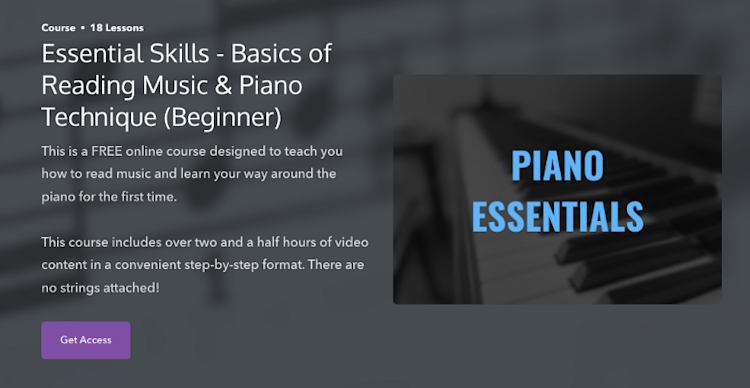
With his free course content doing the heavy lifting, Joseph had more time to create membership materials and work with his students.
However, things weren’t always so streamlined.
“I was really juggling this issue of who do I serve, the students or the teachers?”
In the beginning, Joseph wanted to serve piano teachers as well as students. He quickly learned that having more than one audience can get complicated.
“When the pandemic first hit, I was already entrenched in the online sphere. I got a huge rush of teachers that were interested in [online teaching].”
Joseph offered consultations and created content on his blog and Youtube channel to help teachers adapt to remote education.
“I was really juggling this issue of who do I serve, the students or the teachers? Being faithful to one particular community was pretty much consuming all of my time. I had to make a decision.”
The determining factor? He only had a handful of ideas for serving teachers — but found himself overflowing with ideas for teaching students.
“On the student’s side, no one’s doing what I’m doing at all. It’s almost an untapped market. The people I’m competing against and the piano apps don’t serve classical musicians at all. They just teach four-chord songs and minimally complicated, popular songs. They’re not really focusing very heavily on written music,” Joseph elaborates.
“I’m gonna give you a real classical piano education and save you thousands of dollars.”
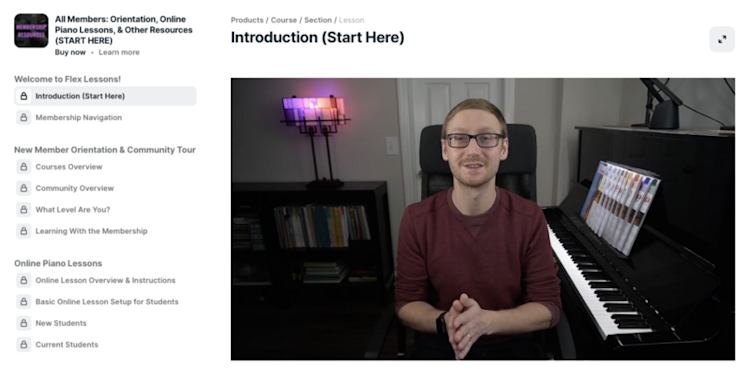
Now, instead of creating content for music teachers, he encourages them to hop into his student community, interact with his learners, and ask for help if needed.
He’s also planning to make an affiliate program so music teachers can earn money by promoting his membership community to their audiences.
“My free course is meant for everybody, not just my students. If other teachers are interested, they can send their students through my course. And at the end of the course, I’ll say, ‘If you’re here from another teacher, this is where you return to them.’ No strings attached, just good networking.”
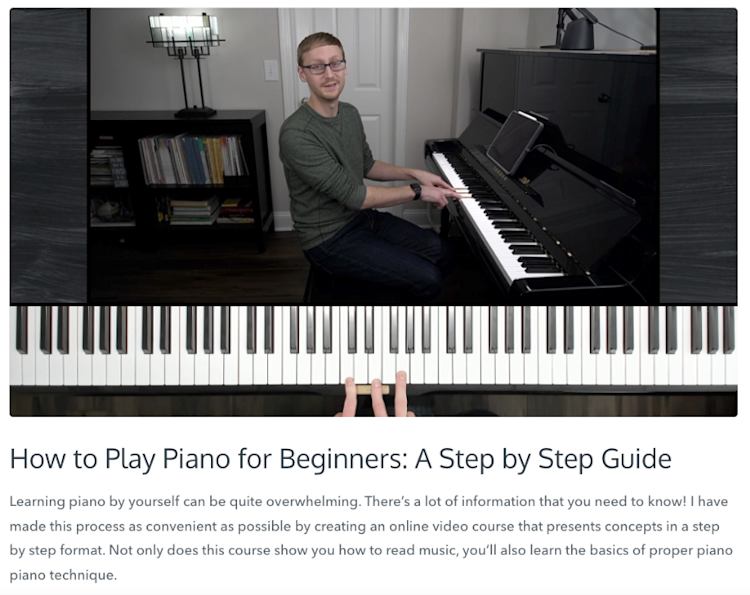
Next, we’ll peel back the curtain to how Joseph built his membership with Podia and his tips for fellow creators.
“It’s built around this idea of optimism and being hopeful for the future and the things you can do if you unleash your creative side.”
Every innovative business needs a home, and Joseph houses his work with Podia.
When asked how he landed on Podia, Joseph explained that he had been researching the best online course platforms and realized that Podia was one of the only all-in-one options. Podia, he explained, had an affordable price tag, intuitive website builder, and beautiful design.
“Podia makes website building so fun. I feel like I could set up a site in an afternoon, and it would look great. And if there’s something to be said for how pretty it is. It’s the best-looking one by far. It’s better than anything you can make on WordPress, hands down.”
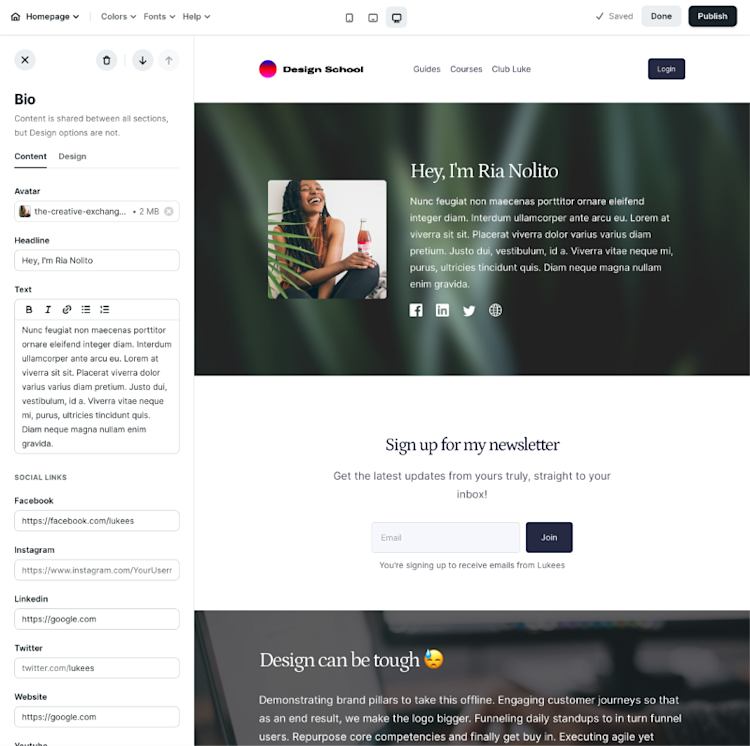
It only took a few days for Joseph to get set up with Podia, and he knew he had found the right fit for his business.
“You can build your own website, you can have memberships, you have all kinds of courses, you can have social stuff. And then the community thing was just gravy.”
“I have a section in my community called, ‘Is it done yet?’ This is where people submit recordings of what they are working on. Members are posting in here left and right, wondering if their piece is done or how they’re sounding.”
Joseph uses this space to give members personalized feedback about their work, and other people in the community chime in too. Getting regular feedback can be a gamechanger for aspiring musicians.
“I could have just charged for that. You get access to somebody who will critique [your piano playing] pretty much whenever you want, within a day or two. If I had figured that out earlier on, I could have offered that immediately.”
Within the community, this feature builds engagement and camaraderie among students. People can see each other’s progress while putting names to faces and building friendships.
They feel less alone while learning a new skill, which helps Joseph’s program stand out.
That said, membership communities like Joseph’s require a lot of content.
While Joseph knew a membership was right for his business, he says he could have started by selling a smaller, stand-alone course while building his extensive library of content.
“Until you have a big treasure trove of content ready, Podia will let you sell courses and products one at a time really inexpensively, and you can have a free community. I just brute-forced my way and made a huge amount of content. It was really hard.”
Selling individual products can generate revenue in the interim since comprehensive memberships don’t happen overnight.
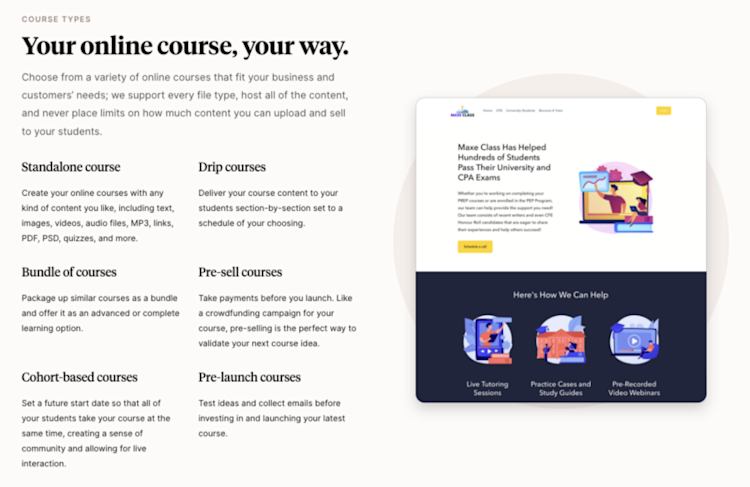
In addition to the ease of use and abundance of features, Joseph enjoys Podia’s uplifting, collaborative energy.
“There’s this community [at Podia], and everyone’s excited. It’s just built around this idea of optimism and being hopeful for the future and the things you can do if you unleash your creative side. It’s amazing. I think Podia is amazing.”
Want to see how Podia can elevate your business? See what you can do with a free 30-day trial.
Joseph’s advice for new creators: “Come in with a plan for marketing.”
When asked to share his advice for fellow creators, Joseph recommends coming in with a marketing plan.
“Build an audience, become known for something, then build your Podia business around that,” Joseph advises.
While Podia comes with all the tools you need to build your online business, it can’t do your marketing for you, he explains.
Use a social media channel to grow an audience and become recognized as an expert. As you create your business game plan, Joseph emphasizes that it’s important to think about how you’ll drive traffic to your offerings from day one.
After all, the more people that know about your work, the greater your impact can be.
Today, Joseph continues to build Flex Lessons and help students around the world discover the joy of classical piano. His ingenuity paid off, and we can’t wait to see what he creates next.
